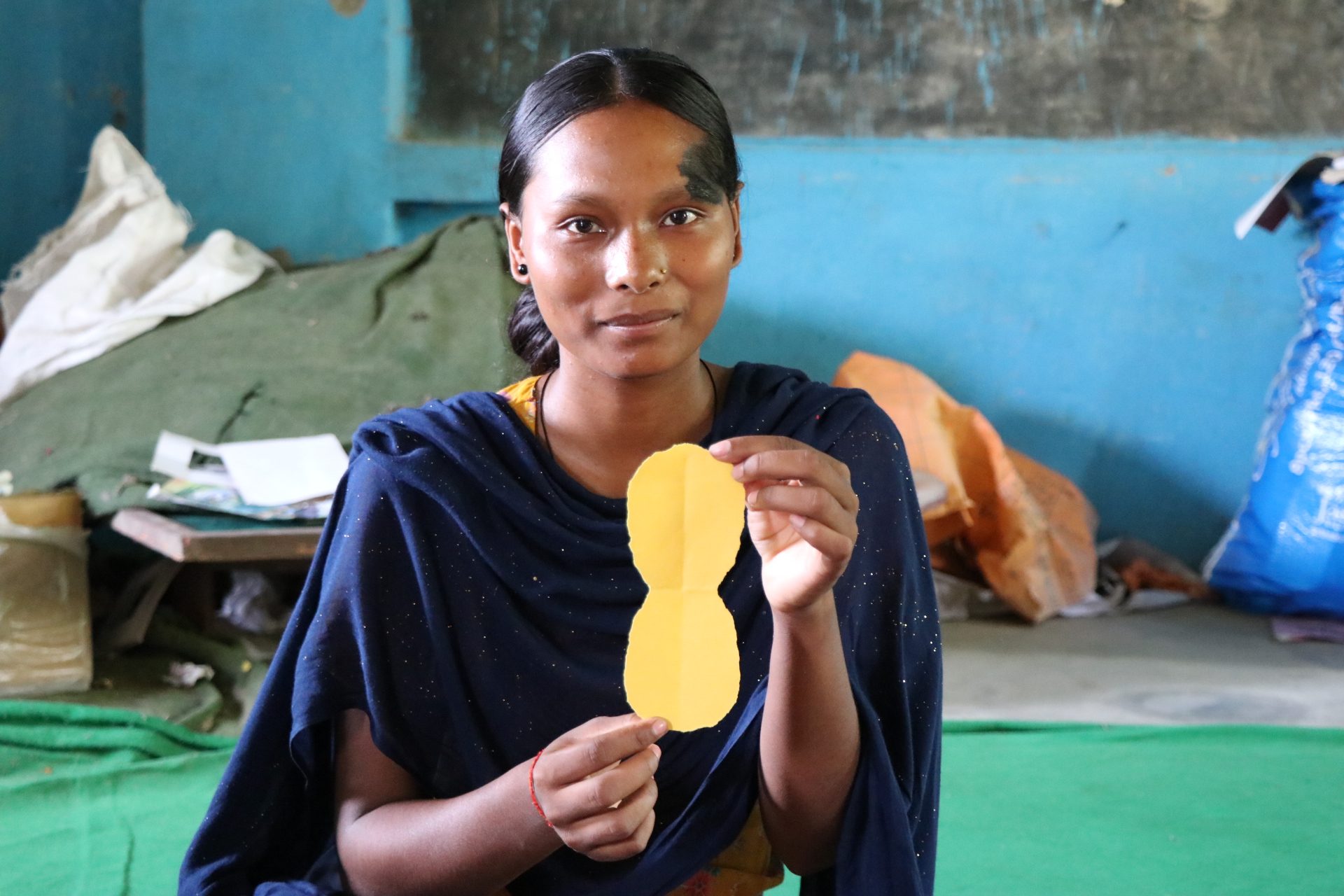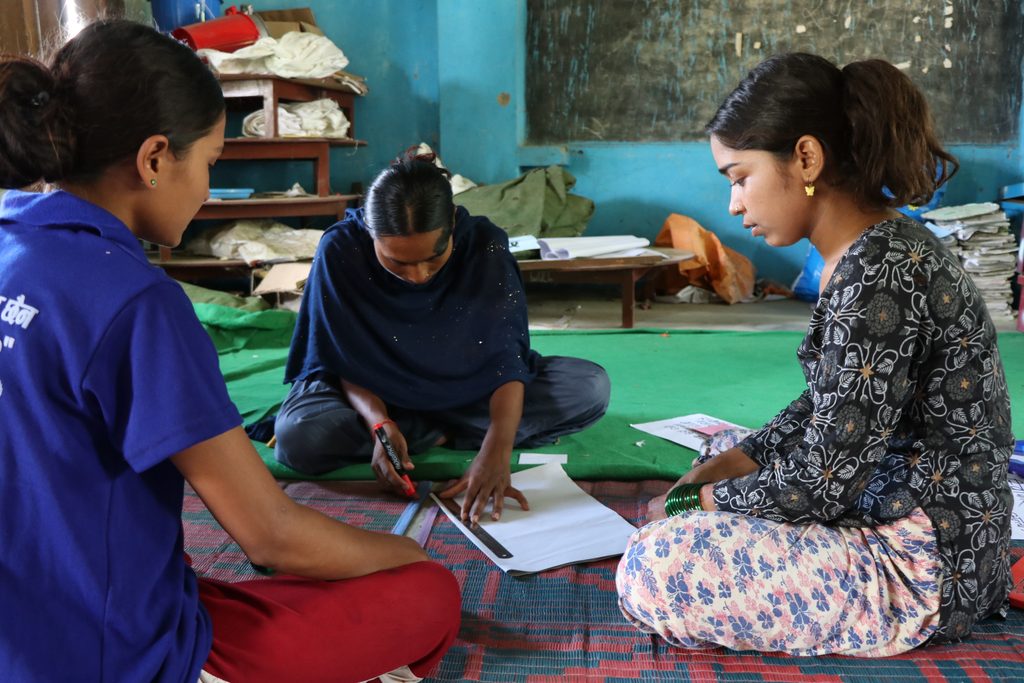Radhika fights against menstrual taboos in her community
After learning about menstruation, Radhika is dispelling myths and supporting other girls to healthily manage their periods.

Radhika, 18, says she had her first period when she was 13. “It was painful and I was worried about the bleeding. I didn’t know what was happening,” she says.
Radhika is just one of millions of girls in Nepal who experience their first period without any understanding of the changes their bodies are going through, or the reasons why.
In many parts of Nepal, menstruation remains a taboo issue, something to be hidden and rarely discussed. In worst-case scenarios, the prevailing negative cultural practices that surround menstruation negatively impact the lives, health, and safety of women and girls and reinforce gender inequalities and exclusion.
As a result, menstruation for many girls and women is not understood or managed effectively, which can harm a girl’s well-being and affect her school attendance and learning opportunities.
Menstruation is still a taboo
Radhika is a member of the Tharu community, an ethnic indigenous group from Bardiya District. Although the Tharu people do not follow any of the harmful practices often imposed on menstruating girls and women in Nepal, internal migration to Bardiya has brought new traditions into the community.
“Women in the Tharu community in Bardiya do not follow any restrictions. Menstruating girls and women are allowed to do their daily tasks as normal. They are not labeled as impure and can touch anything, and anybody without any judgments,” explains community worker Shanta.
She continues: “However, Bardiya is a hub for internal migration so the norms related to menstruation in the Tharu community are starting to be influenced by other cultures. Now, the women and girls in this society have started to restrict themselves from rituals and celebrations during their period.”
“I am committed to normalising discussions about periods and educating young girls.”
Radhika
In some parts of Nepal, women cannot be in their own homes during their period; in others, women can be in the house, but not in the kitchen and worship room. They are also forbidden from touching other people (especially male members of the family or neighbours) or cattle and from growing fruit and vegetables. Women become untouchable.
“Although in my family we do not follow such restrictions, my friends and family have spent most of their lives believing the myths that surround menstruation in my community,” shares Radhika.
Menstrual health information
Most girls have no source of information about menstruation – no one speaks to them about it, either at school or in the family. “My school did not provide us with any information. Teachers often told us to study on our own and the boys were never engaged in discussions related to periods.”
For many girls, their mothers are the main source of information, but often they have a limited understanding of the menstrual process themselves or focus on the social and cultural expectations and restrictions their daughters are expected to observe.
“When I had my first period, my mother gave me some old clothes to use,” Radhika says. “I remember skipping school during my period as the school toilets were not clean. We did not have separate toilets for girls and boys. Nor did we have anywhere private to change.”
Without proper sanitation facilities, girls often miss school when they have their periods, causing them to fall behind in their studies. “I only had a piece of cloth for the whole day. I always had the fear of leaking in school leading to embarrassment and gossip. We used to hide our rags with our school bags. The worst part was standing for hours during the assembly in the morning.”
Champions of Change classes
Four years ago, Radhika was invited to join Champions of Change classes run by Plan International in her community as part of a project to prevent child, early, and forced marriages. There she started to learn more about her body, puberty, the menstrual cycle, myths and taboos around menstruation, and how to manage her period properly.
“This was the first time I was introduced to the biological process of menstruation. I was shocked to learn that menstrual blood is not impure,” says Radhika.
Asha, the Champions of Change facilitator explains that this is not an uncommon reaction from girls, many of whom have never received any information about menstruation before. “I receive different questions from girls when I talk about menstrual health. For example: Why they have painful periods, why they have either short or long periods, can they take medicine to reduce the pain, etc.”
Radhika tells us that she was happy to finally be able to learn more about the subject. “I was encouraged to visit a youth-friendly health centre if my menstrual pain went on for too long. We also discussed the best foods to be eaten when we have a period and how stress can lead to irregular periods.”
Reusable sanitary pad training
The Champions of Change classes equipped Radhika with the information she needed and helped increase her self-confidence. It provides girls with the skills to speak up against the negative cultural norms that harm girls’ health and access to quality sanitary pads.

“After joining the classes, I learned that access to menstrual health services is a girls’ right. Ensuring women and girls have their rights, this, in turn, helps them manage their menstrual hygiene properly and with dignity,” says Radhika.
As the part of Champions of Change module, girls are provided with training on how to make reusable sanitary pads to manage their periods. Radhika received the training 2 years ago and is now one of the trainers teaching younger girls to make homemade pads.
“I cannot afford to buy commercial sanitary pads every month. I am saving my income from the tuition classes that I provide to students in grades 6 and 7 for my higher education,” she explains.
“I am fortunate that I learned how to make sanitary pads. Since then, I have sewn thousands of pads and distributed them to my family members and friends. During lockdown, this was also my source of income as well.”
“I do not use machines. I sew them with my hands. I have taught my mother and sister-in-law. They also support me in making them in bigger numbers.”
Radhika also started to speak about menstrual health with male members of her family. “I regularly discuss menstruation with my brothers. They need to know what biological changes their wives go through during their period. I ask them to support their wives with the household chores and take care of them when they have their periods.”
“Now I have a better understanding of menstruation and why we need to break the gender stereotypes around it,” Radhika says. “I am committed to normalising discussions about periods and educating young girls.”
Categories: Sexual and reproductive health and rights


